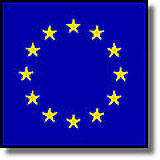An Effective Common Foreign and Security Policy
Common strategies will be defined by unanimous decision on
issues such as relations with Russia. Member states which do not
want to be involved can use "constructive abstention".
These strategies may be implemented by qualified majority
voting, but any state which feels its vital interests are
threatened can block a decision.
The treaty provides for a High Representative to embody the
Common Foreign and Security Policy. The role will be held by the
secretary-general of the Council, a civil servant and not the
high-profile, full-time political figure sought by France.
Opposition by Britain and neutral states prevented agreement
on merging the Western European Union defence grouping in to the
EU. The text speaks of a "possibility of integrating the WEU
into the Union, if the European Council so decides", contrary to
the automatic timetable sought by Germany and France.
The Union created a planning cell of national diplomats,
Council and Commission officials to harmonise positions on
foreign policy and improve coherence with EU trade policy.
The Institutions Of The Union
The leaders almost totally failed to advance on this issue.
It was agreed in principle that when the Union is enlarged,
the big countries would give up one of their two European
commissioners so the size of the Brussels executive does not
exceed 20.
There would be one commissioner per member state on
condition that an agreement was reached on modifying the
weighted votes of member states in the Council. When the number
of member states goes over 20, there will be another complete
review of EU institutions.
Enhanced Cooperation - Flexibility
Member states will be able to move forward in limited areas,
using EU institutions, without waiting for all other countries,
provided that a qualified majority agrees. In some areas, a
unanimous decision will be required for such projects.

